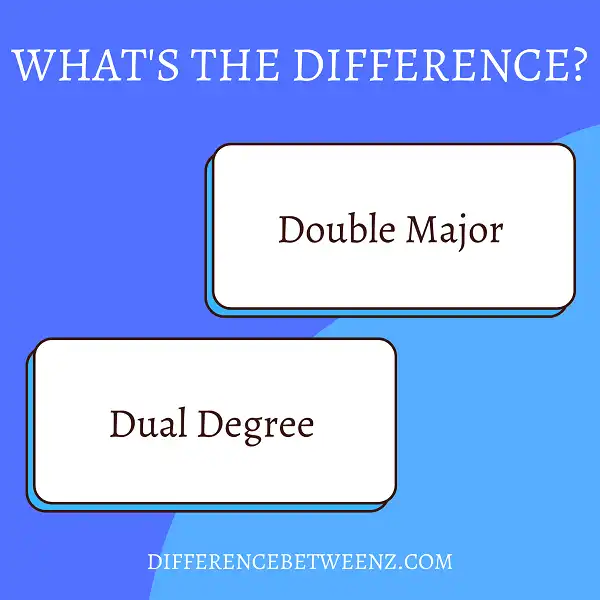Earning a dual degree or double major can seem like a great way to increase your career prospects. But what’s the difference between these two options? And is one better than the other? In this blog post, we’ll explore the pros and cons of each option and help you decide which one is right for you.
What is Dual Degree?
- Dual degree programs offer the opportunity to earn two degrees simultaneously. These programs allow students to complete the requirements for both degrees in a shorter time frame than if they were to pursue each degree separately. Dual degree programs are often offered at the undergraduate and graduate levels, but some universities also offer them at the doctoral level.
- Dual degree programs can be an excellent option for students who are looking to enhance their career prospects or broaden their knowledge base. However, because dual degree programs require a significant commitment of time and energy, they are not right for everyone.
- Before deciding to enroll in a dual degree program, students should carefully consider their goals and priorities to ensure that they are making the best decision for their future.
What is Double Major?
- A Double Major is when a student completes two sets of requirements for two separate majors. Each Double Major requires the student to complete all the requirements for both majors, including coursework and internships/clinical experiences (if applicable). Double Majors often have different timelines for completion, but most students finish both majors within 4-5 years.
- The advantages of Double Majoring are numerous; students gain expertise in two fields, become more marketable to employers, and develop a well-rounded skill set. For instance, a student who has Double Majors in Business and Psychology will have a better understanding of how to manage people and understand customer behavior.
- Double Majoring can also lead to unique opportunities; many students use their Double Major to pursue careers in interdisciplinary fields such as medicine or law. Whether your goal is to increase your employability or explore new areas of interest, Double Majoring is a great option!
Difference between Dual Degree and Double Major
Dual degree and double major are two terms that are often used interchangeably, but there is a subtle difference between the two. A dual degree program is a degree program where you earn two degrees from two different schools.
- For example, you could earn a B.A. in English from one school and a B.S. in Biology from another school. A double major, on the other hand, is when you earn two degrees from the same school.
- So, if you were to attend a school that didn’t offer a dual degree program, you could simply declare a double major in English and Biology and earn your two degrees from the same institution.
- There are pros and cons to both approaches, and it ultimately comes down to what is most convenient and practical for you. Dual degree programs may be more expensive since you’re paying for two sets of tuition, but they can also save time since you’ll be earning two degrees simultaneously.
Double majors may be less expensive since you’re only paying for one set of tuition, but it will take longer to complete since you’ll be completing two sets of coursework. Ultimately, the decision of whether to pursue a dual degree or a double major comes down to your personal preferences and circumstances.
Conclusion
The biggest distinction is that a dual degree program combines undergraduate and graduate coursework into one cohesive experience, while a double major requires students to complete all of their undergraduate coursework in addition to taking on an extra set of classes in their desired field. Both options can be excellent ways for students to gain more expertise in their chosen area of study, but it’s important to weigh the pros and cons of each before making a decision.


